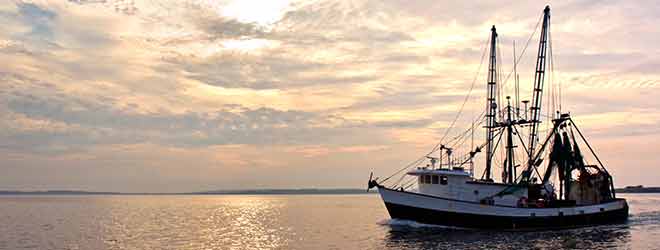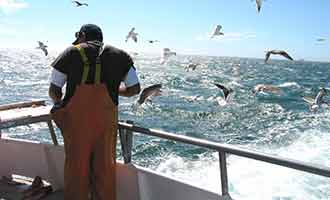
Workers on commercial fishing boats and other seagoing vessels are at greater occupational risk than most other workers. The Jones Act legislation provides protections for workers on US vessels. Our firm is working with some of the leading maritime and admiralty lawyers in the country and a claim and/or maritime lawsuit can be filed on your behalf. Additionally, you will be charged no fee until you receive an award or a settlement. Contact us online or call us 24/7 at 1-800-992-6878 for your free consultation.
Have You Been Injured While Working on the Water?
Contact a RI Maritime and Admiralty Lawyer Today!
Maritime law (also known as admiralty law) is a specialized area of law set aside for the federal government by the United States Constitution. It usually applies to activities that happen outside of state waters. Maritime law is a body of law that is separated from state law, and has its own rules and regulations. An experienced maritime lawyer can help you navigate the difficult waters of these claims.
Maritime Workers Rights
If you have been injured while working on an ocean or waterway, there are specific maritime laws that may apply to your situation. The Jones Act, part of the Merchant Marine Act of 1920, applies to many workers on commercial fishing vessels, yachts, barges, and even some shore-based jobs. The Jones Act provides for unique employee rights for workers in maritime industries. If you work in an industry related to ships and navigation, d’Oliveira & Associates can help you find out if the Jones Act applies to you and help you recover damages for your injuries.
What Types of Injuries Can Occur To Workers At Sea?
 In addition to common workplace injuries resulting from job activities, employees at sea face additional dangers. The fatality rate for commercial fishermen is roughly 36 times greater than that of the average American employee. Fishermen and other employees at sea have additional dangers of falling overboard, their vessels being lost at sea, deck injuries, fires, explosions, or injuries from diving. Like other employees, maritime workers are entitled to damages for occupational accidents and illnesses.
In addition to common workplace injuries resulting from job activities, employees at sea face additional dangers. The fatality rate for commercial fishermen is roughly 36 times greater than that of the average American employee. Fishermen and other employees at sea have additional dangers of falling overboard, their vessels being lost at sea, deck injuries, fires, explosions, or injuries from diving. Like other employees, maritime workers are entitled to damages for occupational accidents and illnesses.
What About a Fatality at Sea?
Commercial fishing was the most dangerous job in the United States in 2006, with 142 deaths per 100,000 workers, compared with 4 deaths per 100,000 workers in other professions. These deaths are primarily due to a combination of severe inclement weather, extreme fatigue as a result of working long shifts, and the dangerous equipment aboard these vessels. If your loved one has been lost at sea, or has been involved in a fatal accident while working at sea, the Jones Act allows for personal representatives to bring claims on behalf of deceased seamen.
How does the Jones Act Protect Commercial Fishermen?
 In the early 1920s, many owners of ships had begun to try to abuse a system known as “flags of convenience.” Under this system, shipping companies would register their ships in foreign countries while doing shipping between US ports, or while fishing out of US ports in US waters. This allowed the companies to pay using other countries’ pay scales, and to use the weaker safety systems available in those countries.
In the early 1920s, many owners of ships had begun to try to abuse a system known as “flags of convenience.” Under this system, shipping companies would register their ships in foreign countries while doing shipping between US ports, or while fishing out of US ports in US waters. This allowed the companies to pay using other countries’ pay scales, and to use the weaker safety systems available in those countries.
Congress stepped in to protect workers on commercial fishing boats and crew members of all ships. It allowed a “seaman injured in the course of employment” to sue his or her employer because of that injury. It also guarantees that when suing an employer, a member of a ship’s crew is entitled to a trial by jury. This is unique because most trials in maritime law do not allow for jury trials.
Who is Protected by the Jones Act?
The Jones Act protects seamen. The law itself does not define what a seaman is, but later court decisions have provided a definition. According to the 1995 Supreme Court case of Chandris, Inc. v. Latsis, a seaman is someone who fits two parts of a test. First, the worker must contribute to the function of the vessel or the completion of its mission. The worker must also, secondly, have a substantial connection to the vessel in terms of nature of the connection and duration of the connection. This definition can be very broad and apply to many different employees on a vessel. Contacting a maritime lawyer will help you determine whether your status makes you eligible to be protected under the Jones Act. If you are found to fit the definition of seaman, then any injury caused by the negligence of your employer or fellow employees may entitle you to recover damages.
Examples of Negligence Covered by the Jones Act:

- Breach of duty to protect seaman from foreseeable injury
- Failure to provide and maintain reasonably safe equipment
- Failure to provide adequate safety measures
- Failure to exercise appropriate care when selecting competent crew members
- Negligent hiring
- Dangerous or unsafe work
- Failure to avoid dangerous weather
- Inadequate instruction regarding safety matters
- Appointing an inexperienced crew member to operate equipment and machinery
- Failure to consider a seaman’s physical limitations when assigning duties
- Failure to provide safety gear (i.e. personal flotation devices) or follow safety rules
- And other acts…
Recoverable Damages under the Jones Act
- Lost past and future income
- Medical expenses
- Pain and suffering
- Disability
- Loss of enjoyment of activities or normal life
Have You Been Injured While Working on a Vessel Flying the US Flag?
If you have been injured while employed by a ship, your location may not matter. Engineers injured in an accident while picking up parts for an engine may be covered by the Jones Act. The cook on a yacht who has stepped ashore to help load or unload provisions may be covered. A crew member helping unload fish after a trip may be covered. An admiralty lawyer can go through your job duties and help you understand whether or not you are eligible for Jones Act coverage in your particular situation.
Do You Need an Admiralty Lawyer or Maritime Lawyer?
 If you or a loved one has been injured or killed while employed as a seaman, you may want to speak with a maritime attorney regarding a potential claim. The injury and disability attorneys at d’Oliveira & Associates are working with some of the leading Jones Act lawyers who are handling these cases.
If you or a loved one has been injured or killed while employed as a seaman, you may want to speak with a maritime attorney regarding a potential claim. The injury and disability attorneys at d’Oliveira & Associates are working with some of the leading Jones Act lawyers who are handling these cases.
Please contact the law offices of d’Oliveira & Associates at 1-800-992-6878 or fill out a contact form for a free legal consultation.
